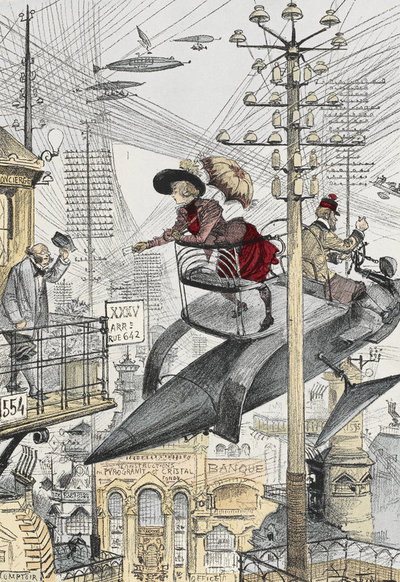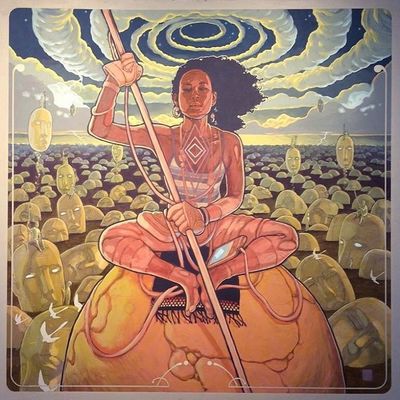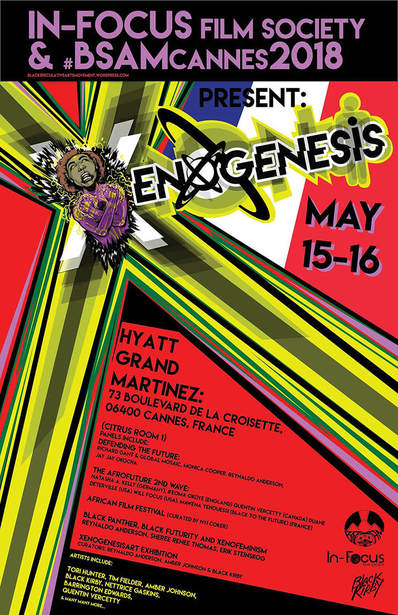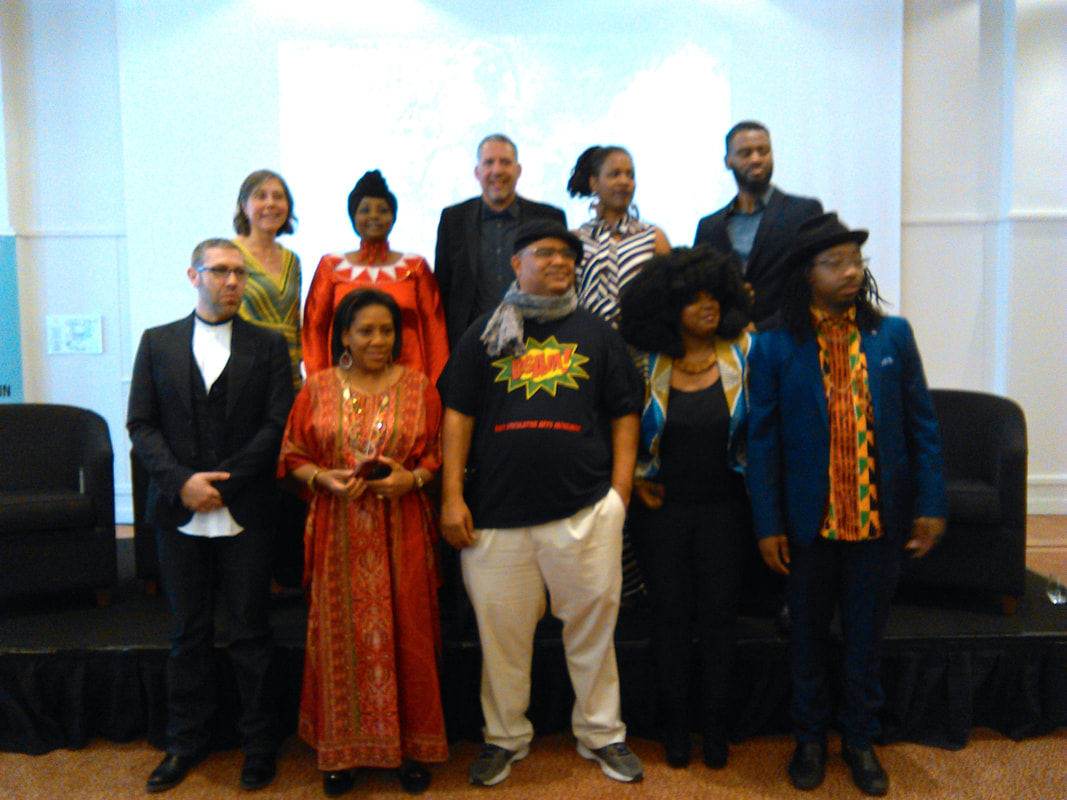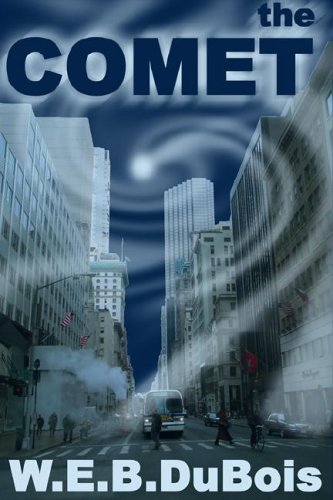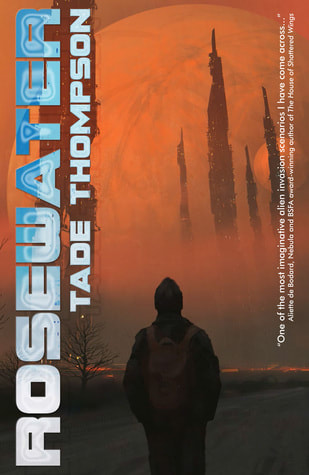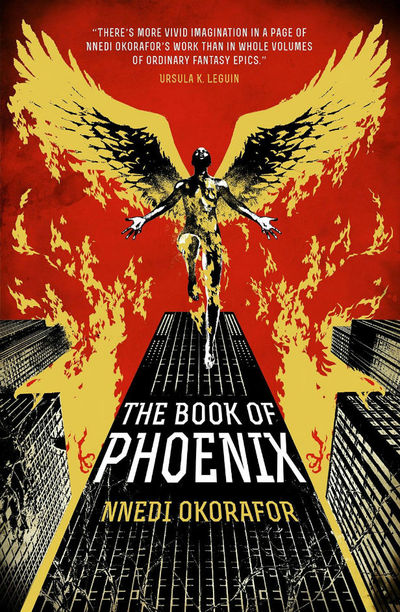|
I live about 30 kilometres from Cannes. So when I realised that Sheree Renée Thomas, writer and editor of the Dark Matter anthology (among others) would be there to talk about Afrofuturism, I had to be there. She very graciously added me to the guest list so I could attend the panels and, very excited about the prospect, there I went. Please note that all errors in quotes or any misattribution of a quote would be entirely mine. Feel free to drop me a line if I did a mistake. 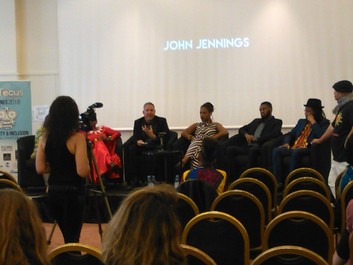 I arrived at the end of the Wednesday morning panel and considering how thoughtful was the discussion, I'm really disappointed I missed what was said earlier. Lonny Avi Brooks said of Afrofuturism that it is a "signal of the future becoming more vigorous", and that it's "a future storytelling using the past" which creates "visions that are infinitely complex." And, indeed, when I talked to Stacey Robinson a bit later, it emphasised how much this complexity and this relation both to past and future are important to creators within the Afrofuturist movement. Stacey Robinson is an artist and teaches graphic design. I asked him: "If we imagine an uchronia in which Africa hasn't been colonised, not plundered, and slavery didn't happen, if we set stories in this Africa, what would things (as in chairs, table, everyday stuff...) look like?" Here is what he told me: "To create the future you have to look at what's already been done, in the diaspora and in Africa." But designs emerge from ethics and morals, so you'd have to consider literacy for instance. "We have to get out of several ways of thinking", said Stacey Robinson, "and particularly how we look at ancient cultures if we are imagining Africa outside colonialism." For him, "ethics should become a centre" ; currently "capitalism drives morals but it should be human centred". But when you consider Afrofuturism, it's not only in relation to African ancient cultures but also to Africa nowadays. Nonetheless, there's a responsibility to "consider Afrofuturism with and without Africa because [Black people] are all around the globe." In a sense, Afrofuturism tells of "the survival of people of colour." Finally, Stacey Robinson drew a parallel with the movie Black Panther, when T'Challa loses the battle, his mother talks to him and here we see the power of the matriarch. Stacey Robinson adds: "I was raised by a single woman, I date women, I have a daughter." So "when designing Afrofuturism," there's also "a moral responsibility towards women in the past and women in the future." A little while later, I found myself in conversation with T. Smith and we talked about this Black Speculative Arts Movement event here in Cannes. For him, just by their presence they were being disruptive. The Cannes Film Festival is a closed world, it's also a very white world. T. Smith tells of all the people taking part in the event, walking on the Croisette together and being stopped because they look different. He added cheekily that they could pretend to be the cast of Black Panther, no one would disbelieve them. T. Smith also gave me this splendid book, Cosmic Underground, A grimoire of Black Speculative Discontent, edited by Dr Reynaldo Anderson (who was there too and sadly I couldn't find the time to chat with him) and John Jennings. It features both amazing Black Speculative Art and essays in relation to Afrofuturism. You can look at the diaporama below to see the table of content and a glimpse at the art. But the bulk of my chat has been with Sheree Renée Thomas. For those of you who wouldn't know her writing, I would urge you to read her short story in So Long, Been Dreaming, an anthology edited by Nalo Hopkinson, in which she chooses a very oral cadence to her writing. As she told me, she tried in it to find the musicality of the Southern state she comes from, something "true to Memphis", "blending the rhythm and evoking the music" while "sounding like a fable". What I was actually keen to talk about with her was Dark Matter, the series of anthology she started editing in 2000 and how it came into being, because to me, Dark Matter truly is a founding moment of modern Afrofuturism. Sheree Renée Thomas starts by telling me that she fell out of the genre as a teen. She needed to see herself and she couldn't. So she began instead to read black writers. She had to find them in library, like Wanda Coleman, Toni Morrison and many more. She "didn't go back to scifi until college" when they read Kindred in class. "It changed the path of my life" says Sheree. In 1998, she went to Barnes and Noble to buy some books. When she went out, she had in her hands a collection of Japanese scifi. She says: "I have to read a collection of Japanese scifi because no one did it for Black writers! No one had done it". So she did a wish list, with who she wanted to see in it. An editor for a major publisher at the time, she managed to go to an event with Octavia Butler and Walter Mosley: "I pitched it to Octavia Butler, she said yes. I pitched to Walter Mosley, he said yes." But the path until Dark Matter would be edited was still long as she succeeded in being enrolled at Clarion, at the same time as Andrea Hairston, who recently wrote Would do Magic for Small Change. Her time at Clarion was both uplifting and challenging, making friends but also challenging prejudices and a certain way of doing things, and most of all, writing, writing and writing. But still she kept on working on Dark Matter. She says "I had a huge responsibility, to Black readers but also to future Black writers" and also to past writers, as the anthology also includes classic stories such as "The Comet" by W.E.B DuBois and "The Space Traders" by Derrick Bell. Dark Matter went on to win the World Fantasy Award for Best Anthology in 2001. Honestly, the conversation went on and on and we both went on many digressions. Chatting with Sheree has been both an honour and a pleasure. It was fantastic to hear this remarkably hard working, funny and talented woman talk about a genre, an industry and writers she loves and knows so well. I'll end this post with Dr Natasha Kelly's uplifting words: "We are the future, we are the vision of our ancestors. We are still on the way to freedom, yet we are so privileged to go to school, read. We owe it to our ancestors and to our children to create the future. Because of their vision, we are here." If you want to know more about some of the people I met: Stacey Robinson portfolio can be found here; Dr Nathasha Kelly's Twitter account is here ; Dr Reynaldo Anderson Twitter account is here; Sheree Renée Thomas website is here and here is her Twitter account; In-Focus Film Society website is here. (I lost many cards that were very kindly given to me... So I'm missing a couple of names here. Please feel free to drop me a line so I can add you! I'm known to be quite forgetful...) I would like to thank again Sheree Renée Thomas and everyone at BSAM and In-Focus Film for welcoming me so warmly and for taking the time to talk with me. I spent an exhilarating time, talking to wonderful and thoughtful creative people. Do you want to read Afrofuturism? Here are three stories I've reviewed.
2 Comments
Morgan Pierce
13/6/2018 05:11:13 pm
Hello, I attended this event and also took photos. Would you like a clearer picture to post here?
Reply
Hi Morgan! Sorry for approving your comment and getting back to you so late. I'd be glad to post your picture, of course I'll credit it to you. I'll contact you by email within the next ten days. If not, feel free to contact me using the contact form. (Life's a bit chaotic at the moment!)
Reply
Your comment will be posted after it is approved.
Leave a Reply. |
"While we were reading" is an irregular feature about reading science-fiction and fantasy. It can contain guest posts. Nothing fancy, come as you are.
It is also home to all the Subjective Chaos Kind of Awards announcements. |
WHAT IS THE MIDDLE SHELF?
The middle shelf is a science-fiction and fantasy books reviewS blog, bringing you diverse and great stories .
PLEASE SUPPORT AUTHORS.
IF YOU LIKE IT, BUY IT. |
ON THE MIDDLE SHELF
|
KEEP IN TOUCH WITH THE MIDDLE SHELF
|
